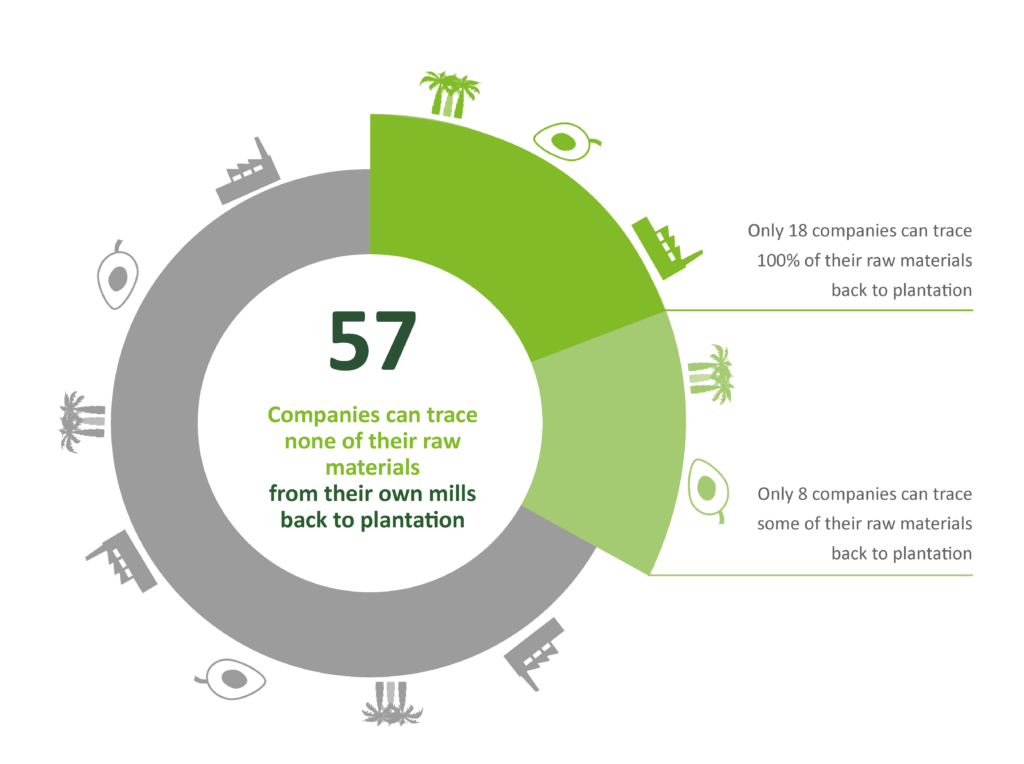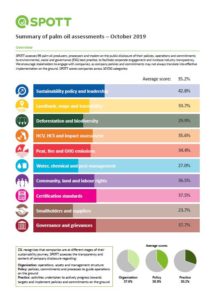International conservation charity ZSL (Zoological Society of London) today calls on global businesses to step up scrutiny on palm oil, as a new analysis by the charity reveals that the majority of the world’s most significant palm oil companies do not know where their palm oil originates from.
Found in shampoos, biscuits and lipsticks – and commonly used as a cooking oil in African and Asian countries – palm oil can be found in many households across the globe.
The increased production of palm oil over the last few decades from 4.5 million tonnes in 1980 to over 70 million tonnes now, has been associated with the destruction of tropical forests, declines of endangered wildlife and displacement of local communities, prompting companies to increasingly adopt commitments guaranteeing that palm oil in their supply chain is sustainable.
Analysis of 99 producers, processors and traders of palm oil released today by ZSL found that, although more than two-thirds of companies (54 out of 83) have zero deforestation commitments and more than half of companies (55 out of 95) have commitments to respect the rights of local communities – most companies do not have a full understanding of the origin of all palm oil in their supply chain or a robust monitoring system in place to ensure palm oil meets their sustainability commitments.
The analysis undertaken by ZSL’s SPOTT initiative showed that only 18 out of 83 (22%) companies report that they can trace 100% of the raw materials arriving at their own mills back to the plantation where it was grown. In addition, no companies that purchase palm oil from external suppliers were able to trace 100% of their supply back to the plantation.

Michael Guindon, ZSL’s Palm Oil Technical Advisor said: “Achieving 100% traceability in the palm oil sector is difficult as palm oil supply chains are extremely complex, with palm oil moving between several intermediaries before it makes its way into a product on supermarket shelves.
“Understanding one’s supply chain is a critical step; however, it’s only one piece of the puzzle. More importantly, companies should not only understand their supply chain thoroughly. They also need to use their buying power and work intensely to enforce the highest sustainability standards in every palm oil provider they do business with.”
The ZSL analysis also found only 19 out of 80 (24%) companies assessed on SPOTT publicly disclose the processes they use to assess risks within their supply chain, and only 21 out of 80 (26%) companies have programmes to support their high-risk suppliers to become compliant with their policies. Being transparent helps to reassure interested stakeholders such as investors, NGOs and buyers of their sustainability levels.
Michael Guindon continued: “Problems further up the supply chain mean it’s likely that unsustainable palm oil is making its way into products on supermarket shelves, providing risks to companies in meeting their sustainability commitments.”
Companies can purchase palm oil certified by the RSPO (Roundtable on Sustainable Palm Oil) – the world’s largest palm oil certification scheme, to ensure that their products adhere to stringent sustainability requirements.
However, only around 20% of the world’s palm oil is RSPO certified – driven both by a lack of consumer demand, particularly in the world’s largest consuming countries (India, China, Indonesia and Malaysia), and by polarising public campaigns to boycott palm oil due to its negative environmental and social impacts.
A straight boycotting of palm oil products, however, is not the way forward to protect wildlife or humans involved in the industry – as it is currently the most efficient vegetable oil crop in terms of yield per hectare, and a significant source of income in producing countries. Without palm oil, countries would be forced to turn to another bio-product to fuel demand, which would likely mean larger areas of precious wildlife habitat destroyed.
Peter van der Werf, Senior Engagement Specialist, in Robeco’s Active Ownership team said: “Companies have a responsibility to ensure the products they’re supplying are deforestation-free, preserve biodiversity and respect the rights of workers and local communities.
“Robeco has been engaging with the palm oil sector for nearly ten years and we have drawn a line for companies who are not willing to step up their game towards more sustainable practices by excluding them from our investable universe. At the same time, we are actively engaging with those we believe are capable of reaching the sustainability objectives we set by 2021.”
ZSL recommends that companies must accelerate progress to meet their sustainability commitments. This can be achieved through a combination of three strategies: monitoring their full supply chain and investing in traceability systems to ensure compliance against their sourcing policies; ensuring that companies purchase from suppliers who employ this same strategy; and purchasing palm oil from credible certification schemes such as the RSPO.

